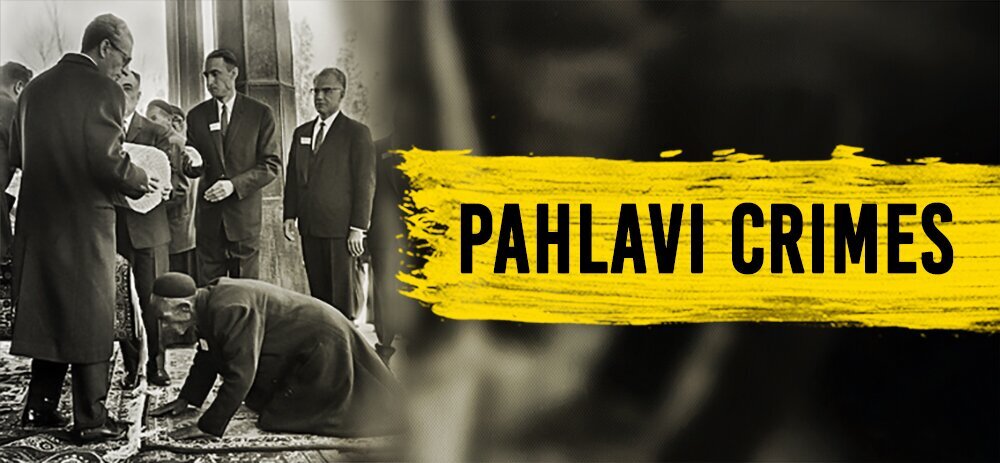Hawzah News Agency – On the occasion of the Iranians' 43rd anniversary of victory of Islamic Revolution, some of crimes committed by Pahlavi King against Iran are presented to you, respected readers:
The souvenir Reza Khan brought from the west to Iran
When Reza Khan, the domineering bully, wanted to introduce us to western traditions, the first thing he brought over was the style of clothing and the removal of the veil: that was accomplished by use of force through his style of bullying! Dresses needed to be short; hats needed to be a special model--they even changed the name, hats became chapeaux! If anyone dared to wear a hat different from the "Pahlavi hat," which was the name given to the style worn at the time, or wore a long dress, they were beaten and repelled. They adopted these traditions from western culture. Women were not allowed to keep their veils. Their chadors (the Iranian hijab) were already forbidden. If they covered their hair and neck, they were beaten! Why? Because, in the West women did not wear head scarves. These styles were adopted from the West. They didn’t bring what was really needed for our nation. No knowledge, no experience, assiduousness and hard-working or risk taking habits--which were the good aspects of the western culture--none, were ever introduced to us. On the other hand, the things that were brought to our nation were accepted systematically. They brought ideas, but they accepted them with no analysis. They said we had to follow them because it came from the West. The clothing, eating, speaking, and even their style of walking were like that of westerners, so they were supposed to be accepted. There was no way out of it. For a country, this is the worst kind of poison.
The biggest treason to Iran’s economy was committed by the Pahlavi regime
The Pahlavi regime committed the greatest treason to Iran's economy, not just the economy of their time, but also to our economic foundations as its implications lasted for years to come. They transformed Iran to a storage for worthless, useless imported western goods. They bought cheap instruments and unnecessary and disproportionate things at exorbitant prices. They completely destroyed the once self-sufficient agriculture of this country; to an extent that years later, even now, our agriculture has not found its previous status. Because the waves of immigration [from villages to the city] that they incited, was not something that could be easily stopped. They made the nation dependent on foreign countries in agriculture. They bought wheat from the US. The wheat storage facilities were built by the Soviets, too. That is, we were dependent for our wheat and for its storage. They ruined the rural areas. They stopped the industry which was to progress. The progress that was needed in the industry to stop imports was not made. Active industry was halted in this country and a dependent industry was encouraged that relied on imports as much as or more than it produced. They stopped science. They talked a lot about universities and students, but practically, the country's universities had minimum scientific activity. Any brilliant and active talent, if they wanted to flourish, if they were not suppressed in the country, had to leave to work abroad. It was impossible here. They gave foreign companies dominance over much of the country's economic resources and gave away much of oil reserves for free.
The Pahlavi regime was the worst among the corrupt regimes of this region in imprudence, corruption and dependency on foreign powers
The Pahlavi regime—which was the worst in terms of imprudence, corruption and dependency on foreign powers among the corrupt regimes of this region—brought about the severest harms to the people and the country during decades in power. The nation was kept out of the political scene of the country through violent dictatorship and ruthless repression. The interests of the country were sacrificed for compromise with intervening powers and pillaging corporations. The youth were dejected from reflecting on the fate of the country by widespread corruption and lewdness, and every rising voice complaining and seeking liberty was muffled. By ruining national agriculture and making the already defective and flawed industry dependent; by giving room to the greedy foreigners and the monarchy’s servants to plunder; by looting oil reserves and giving away national resources to American and European masters; by destroying rural areas and transforming Iran to a market for useless imported goods and leftover of U.S. agricultural products; and other such treasonous programs, the country's economy was in a constant tumble, and dependent on the will of foreign powers, and the nation's livelihood was in the hands of the enemies. The Iranian nation's faith, culture and beliefs were scorned, and the regime had embarked on a mission against this great nation's self-confidence, and self-esteem through defying these beliefs and encouraging imposed Western culture. Religion and the clergy—who had been the source of call for justice, liberty and equality for centuries and the main resistance front against invasion by the foreigners, the cruel, and the despots—were target of the harshest of revenges, and treated with all means of coercion, intimidation, accusation, and negative propaganda. While most people were suffering from poverty, famine, and low living standards, they were even more pressured on the one hand by the extravagant, luxurious, and wasteful fairytale-like lifestyle of the Shah, his family, friends and strongmen, and on the other hand by the pillaging of national resources by foreign companies and their domestic brokers.
To be continued...
Source: Khamenei.ir


Your Comment